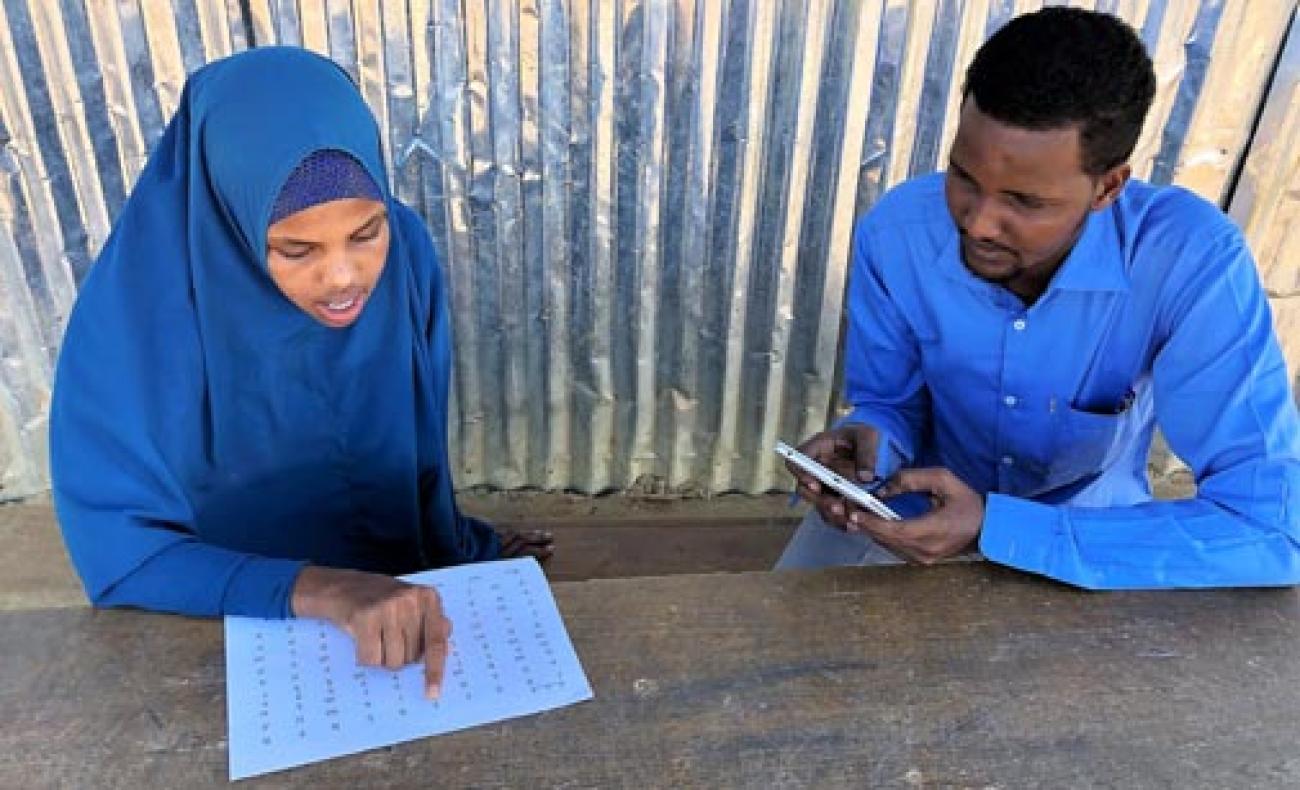From dark to brighter days of learning

Two years ago, as drought devastated parts of Somalia fourteen-year old Faylehay and her family were forced to leave their homes in a village near Qansaxdhere.
BAIDOA, Somalia, 30 May 2019 – Two years ago, as drought devastated parts of Somalia fourteen-year old Faylehay and her family were forced to leave their homes in a village near Qansaxdhere district, and travel more than 80km to Baidoa town in search of safe water and the necessities of life.
Faylehay’s family was just one of thousands of families forced to leave their homes during the drought. Families who arrived in Baidoa established Moqor and Mayow Internally Displaced Persons Camp (IDP) camp, where Faylehay still lives with her mother and her elder brother, while her father remains in Buulo Fuur, their home-village.
Before arriving in Baidoa, Faylehay had never been to school. When she was in her home village, she spent most of her time supporting her family - looking after younger siblings, raising animals, cooking, washing clothes, and fetching water and firewood.
“In rural areas and among pastoralist communities, from dawn to dust, and as a girl, you are always busy doing something,” she said. “Girls do not have an opportunity to learn anything. We are not even allowed to attend Quranic schools. Instead, in our culture boys have the privilege to attend the Quran schools.”
Throughout Somalia, particularly in rural and remote areas, and among pastoral communities, gender inequality is high. Girls’ education is deemed of low value for families. The challenges are further compounded among displaced communities. Decades of poverty and insecurity in Somalia has had a negative impact on access to education for children, resulting in low enrolment and attendance at school, with girls particularly affected. Only 21 per cent of girls attend primary school, and under 5 per cent attend secondary school; limiting their ability to fulfil their potential. Lack of gender-sensitive sanitation facilities, girls’ household chores and early marriage are other key issues, keeping girls out of school.
Since arriving in Baidoa, Faylehay, however, has been benefitting from vital education opportunities through the Alternative Basic Education (ABE) centre in the camp, thanks to the support of UNICEF, BREC and USAID.
Last month brought an exciting day for Faylehay, as Ministry of Education officials, trained by UNICEF on the use of the Early Grade Reading Assessment (EGRA) tool visited the ABE centres in Moqor and Mayow to assess the students on how well they read. With the support of USAID, UNICEF adopted, piloted and trained 50 education officials to use EGRA to assess children’s reading and learning.
“Now I am at level two in reading and very proud to reach this level in such a short period,” Faylehay revealed with a smile. “I also get to play volleyball, jumping ropes, and have fun with my friends.”
Results from EGRA will assist the Ministry of Education to identify and implement the necessary improvements in teaching methodology, curriculum, and learning materials so that all Somali students can gain better learning outcomes.
“In the future I want to graduate from university, especially the Education Faculty, and become a teacher.” Faylehay paused for a moment then firmly concluded, “Then one day I will go back to my village and change the elders’ ideas that ‘boys are more valuable than girls’. I would offer free education to all the boys and girls who are out of the school in Buulo Fuur village.”
The ABE centre Faylehay attends is supported by UNICEF, in partnership with BREC. With generous funding from the USAID, UNICEF is supporting 96 ABE centres like this for children. All these centres are equipped with safe drinking water, sanitation facilities, and provided with teaching, learning and recreational materials. Thanks to such efforts, over 20,000 vulnerable girls and boys like Faylehay are accessing flexible alternative pathways. They now have a chance to pursue an education, many for the first time in their lives.
Link to original story.



